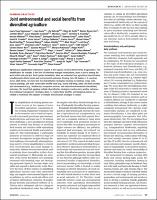Joint environmental and social benefits from diversified agriculture
Fecha de publicación
04-04-2024Autor
Cerda, Rolando
Objetivos de desarrollo sostenible
ODS 6 - Agua limpia y saneamiento
ODS 12 - Producción y consumo responsables
ODS 13 - Acción por el clima
Tipo
Artículo
Metadatos
Mostrar el registro completo del ítemResumen
Agricultural simplification continues to expand at the expense of more diverse forms of agriculture. This simplification, for example, in the form of intensively managed monocultures, poses a risk to keeping the world within safe and just Earth system boundaries. Here, we estimated how agricultural diversification simultaneously affects social and environmental outcomes. Drawing from 24 studies in 11 countries across 2655 farms, we show how five diversification strategies focusing on livestock, crops, soils, noncrop plantings, and water conservation benefit social (e.g., human well-being, yields, and food security) and environmental (e.g., biodiversity, ecosystem services, and reduced environmental externalities) outcomes. We found that applying multiple diversification strategies creates more positive outcomes than individual management strategies alone. To realize these benefits, well-designed policies are needed to incentivize the adoption of multiple diversification strategies in unison.
Palabras clave
Representación
Sede Central
Es parte de
Science
Status
restrictedAccess
URI enlace
https://doi.org/10.1126/science.adj1914


